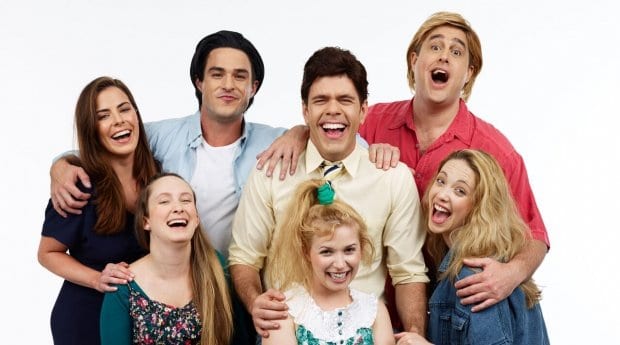I expected to hate Full House: The Musical. I loathed the TV show — who didn’t? — and doubted that even a parody could be anything but repulsive. And while having Perez Hilton as the star (playing Danny Tanner) may appeal to some, I really couldn’t care less. Isn’t he one of those people who’s famous for no good reason?
But I didn’t hate it. I’m almost disappointed in myself for not hating it, because I really kind of wanted to. Maybe I was dazzled or distracted by Hilton’s poor singing and large, muppet-shaped head, but it was actually funny most of the time.
Those of us unfortunate enough to have experienced the ’90s know the sitcom Full House. Widower Danny Tanner has his friend and his brother-in-law move in to help him raise his three daughters. Wackiness (and more than one tiresome catchphrase) ensues! It’s framed as an unconventional situation, but it’s really just a differently shaped family that’s still way better than yours.
The musical takes the more ridiculous bits from the series, inserts some raunch and dials up the crazy. We get the hilarious revelation that Stephanie and DJ spend much of their time making out in their shared room. Michelle, played by Marshall Louise, is only ever referred to as Mary Kate and Ashley. And Jesse explains that because he’s so Greek — from the island of Papadildos, or whatever — all he needs to do to marry Rebecca is walk her around a table.
It does a good job of mocking anything that reeks of the ’90s, including Rebecca, the intensely independent woman whose shoulder pads also have shoulder pads. It also highlights how the show fails to include women in the plot in any meaningful way and glosses over what life in the city is really like — the song about there being no gays in San Francisco is a gem.
Danny occasionally steps in to solve his family’s problems with his super power: Dad Speeches (always to soft piano music). But when Mary Kate and Ashley loses her memory, Danny loses his ability to make speeches — will he get back his power in time to save his family?
Do we care? It’s the climax of the musical, but it’s also the least funny part — right after the intermission. Danny, now bereft of Dad Speeches, starts insisting on being called Bob Saget and capers around, swearing like a sailor and acting insane. There’s too much yelling, too little plot and too many meta jokes.
Louise, thankfully, saves the day. When Mary Kate and Ashley loses her memory, she becomes more like the modern-day, real-life Mary Kate and Ashley Olsen (but again, trapped in one body). The best part of the musical is Louise’s hilarious portrayal of the pair, moping around in an absurd poncho and big, stupid sunglasses.
Full House: The Musical
Runs until Sunday, Sept 6, 2015, various showtimes
Randolph Theatre, 736 Bathurst St, Toronto
fullhousethemusical.com


 Why you can trust Xtra
Why you can trust Xtra


